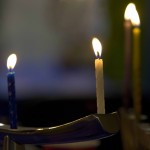Over the years I have come to appreciate how Jewish customs give us time to grieve and to heal. When we lose someone beloved, we are allowed a week away from the world. We are not made responsible for meals or for everyday chores. Those who visit us during shiva, the first seven days of mourning, are reminded not to expect us to be responsive or even sociable – the rabbis advise the community just to sit with those who mourn, not to try and comfort them, but to witness their grief and to honor it.
Only at the end of the week do we make the first tremulous steps back into the world. A mourner is gently accompanied outside and taken for a short walk around the block. The mourner, like someone recovering from illness, is weak and needs support.
For thirty days, during shloshim, mourners are allowed time to feel free from social obligations. Only after a month, should we expect a mourner to be able to attend celebrations and festivals. And our liturgy offers mourners a prayer to recite each day for a year. Those who have recited the Mourner’s Kaddish each day know how it can become a meditation on memory, an acknowledgment of loss. We mark the yahrzeit of our loss, we remember our beloveds at particular liturgical times each year with a yahrzeit service. We give ourselves time.
Over a decade ago, long before our congregation came into existence, I experienced medical challenges I struggled with mostly on my own. Of course, Ralf was my support and my strength. Still, hardly anyone knew what was happening and I still prefer not to speak of that time. But what happened left me with fears, particularly around surgery.
So even though a thyroidectomy is not major surgery, and even though I am likely not facing anything terribly threatening to my health, I have been unsettled and uneasy.
I realized, though, that I could rely far more on Jewish tradition than I ever imagined possible when there was no congregation nearby. Now, I am part of a loving community. I realized that it was all right to ask for help. I thought about our mourning traditions around shiva and shloshim. I became aware that these traditions served as a model for those who were facing medical challenges.
I decided that I would take seven days after the surgery to rest and recuperate, and remind myself that I was not obligated to do everyday tasks. I was going to plan for quiet and rest.
I was further going to listen to my surgeon when he told me that it could take a month for me to feel like myself. I was going to say (and sing, as soon as I could!) healing prayers. I would recite Modah Ani, to thank God for the miracle of my body and Elohai Neshama, to express thanks for the gift of my soul.
Why do I write this?
Because I would like to remind us all that Jewish tradition and our liturgy afford us ample opportunity to grieve as long as we feel our grief, to take the time we ourselves decide we need to heal, and to rely on the community to help take care of us. I write this so that you know that I am grateful for your support, for your good wishes, and for your prayers.
One important Jewish tradition is to have a dedicated group of congregational members at the ready to organize and mobilize support for those of us in need. Heather Chait, as you all know, has just stepped forward to reform our Chicken Soup Committee. Its members might write cards, make calls, and help mobilize us all when our help is needed. It’s not hard to write a get-well card or make a phone call to check on an elderly congregant or to use internet resources that help the congregation respond with meals or other services if someone is taken seriously ill. Please join – we can all take a turn!
May we share in taking care of each other. May we practice lovingkindess and patience. May we be gentle with ourselves and others.
And may we say, “amen.”
Rabbi Barbara






